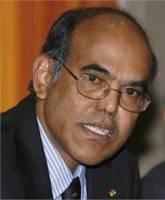 | « Back to article | Print this article |
The Reserve Bank of India (RBI) on Thursday said capital inflows could hurt the economy if they exceeded the absorptive capacity, adding that there were no easy ways to deal with excess flows. "What exacerbates the problem is that these flows are prone to 'sudden stops and reversals' - they can reverse directions and go out of an economy suddenly, as happened during the crisis - and can dent financial stability," RBI Governor D Subbarao said during a speech at Sambalpur University in Orissa.
"What exacerbates the problem is that these flows are prone to 'sudden stops and reversals' - they can reverse directions and go out of an economy suddenly, as happened during the crisis - and can dent financial stability," RBI Governor D Subbarao said during a speech at Sambalpur University in Orissa.
Subbarao said RBI has a preference for non-debt flows such as foreign equity over debt flows, and for long-term flows like foreign direct investment over short-term flows like foreign institutional investment.
The quantitative easing undertaken by the US Fed has triggered larger capital flows to emerging market economies, which has in turn put upward pressure on exchange rates in these economies and eroded their export competitiveness as well as pushed up asset prices.
However, RBI believes that exchange rates should be allowed to be determined by the market forces. "We believe it is in our collective interest as global citizens if exchange rates are allowed to be determined by market fundamentals," Subbarao said.
The governor also said the central bank did not target a specific exchange rate or a rate band, and intervenes in the foreign exchange market not for liquidity management purpose, but to contain volatility and prevent disruptions to macroeconomic stability.
"Indeed one of the important issues on the G-20 agenda is to reach an agreement to end currency wars... to reach a shared understanding on what types of interventions may be appropriate to manage the external sector and under what circumstances," he said.
The governor also reminded that managing the growth inflation tension had been the biggest challenge in the aftermath of the crisis.